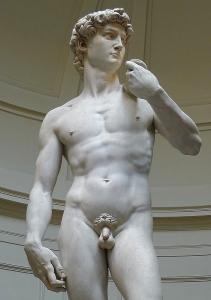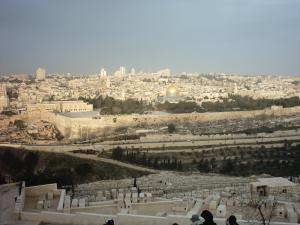 This is a deeply troubling passage of Scripture. It at one level appears to be rooted in history. David has been king of the southern tribes, mainly his own clan of Judah, for seven years, during the struggle for control of the whole land between the remnants of Saul’s family and army and David’s increasingly powerful forces. After the murder of Abner, Saul’s general, who has rejected Saul’s son, Ishbaal (or Ishbosheth) and handed Saul’s army over to David, the people of Hebron crown David king of the whole land. Immediately, David seeks a capital city, and soon determines that the fortress of Jerusalem, a city controlled by the Jebusites, about whom we know precisely nothing, will be perfect for his expanding purposes. It is centrally located in the highlands between north and south, it is easily defensible, sited on a high promontory, surrounded by deep valleys on three sides, backed up against a mountain range on the fourth. David decides that he must have this place for his capital, and plots a campaign to take the city from its Jebusite inhabitants.
This is a deeply troubling passage of Scripture. It at one level appears to be rooted in history. David has been king of the southern tribes, mainly his own clan of Judah, for seven years, during the struggle for control of the whole land between the remnants of Saul’s family and army and David’s increasingly powerful forces. After the murder of Abner, Saul’s general, who has rejected Saul’s son, Ishbaal (or Ishbosheth) and handed Saul’s army over to David, the people of Hebron crown David king of the whole land. Immediately, David seeks a capital city, and soon determines that the fortress of Jerusalem, a city controlled by the Jebusites, about whom we know precisely nothing, will be perfect for his expanding purposes. It is centrally located in the highlands between north and south, it is easily defensible, sited on a high promontory, surrounded by deep valleys on three sides, backed up against a mountain range on the fourth. David decides that he must have this place for his capital, and plots a campaign to take the city from its Jebusite inhabitants.
But here the story gets weird and quite difficult to understand. Jerusalem is of course not a prize easily to be won, as I have noted. Unfortunately, the Hebrew text is difficult, too, at several key places, but I think we can reconstruct something of what the author may have had in mind. David heads toward Jerusalem with a force he imagines is large enough to take the city. Standing at the base of the “stronghold of Zion,” an apparently sheer wall leading to the city’s fortress, David is taunted by the Jebusite defenders, “You will not come in here; even the blind and the lame will turn you back” (2 Sam 5:6). While hurling this obvious insult at David, they are thinking that “David cannot come in here” (2 Sam.5:6b). Nevertheless, David does capture the place, apparently by slithering up a “water shaft” (zinnor), thus entering the city by stealth and surprise. 1 Chronicles 11:6, a retelling of this account, adds the notion that David promised the generalship of his army to the first man who could make his way into the city. That man is Joab, the man who indeed does take over control of David’s army for the remainder of the king’s reign. The scene then would include Joab’s ascent up a tunnel, designed to bring water to the besieged city, and his surprise defeat of the overmatched Jebusites.
But what of that terrible claim that David’s very life hates the blind and the lame, and as a result of that hatred, such handicapped persons are excluded forever from “the house?” Does this mean the later temple of Jerusalem, which indeed did have a long tradition of denying entrance to crippled people? If so, then this story is a much later addition to the account of David’s victory, added here by later interpreters, looking for a fatuously ancient reason to exclude disabled people from the temple. Or does it mean David’s house, his own palace, later built in Jerusalem? Or might it mean that David is merely hurling the taunt back into the faces of those who taunted him first, laughing cruelly at those Jebusites who imagined they could stall the rise of the mighty David?
Since David later takes the sadly crippled Mephibosheth, son of Jonathan, grandson of Saul, into his own house, and cares for his every need, it seems highly unlikely that David has some sort of general aversion to those who are disabled. I understand that David wants to keep a close eye on this heir of Saul’s kingship in order to be certain that he is no threat to the Davidic throne, but the fact of Mephibosheth’s handicap is striking, given this scene of the capture of Jerusalem.
I have decided not to tell a story of my own devising today, since the tale given to us by the lectionary is so complex and needs a bit of untangling. And though the lectionary collectors have avoided the particularly hard bits of the tale, vss.6-8, without those verses, the story is surely incomplete. We are left only with David’s renaming of the city after himself, an arrogant act fully worthy of the arrogant man he will soon appear to be, and the theological excuse of vs.10 that gives divine approval for every action of the new king, “for YHWH, God of the Armies, is with him.” Thus, we have propaganda here, announcing that the new king of Israel has become so because he has been chosen and approved by the God of Israel.
This all sounds worryingly like many religious folk today who have claimed, and continue to claim, that Donald Trump is president because God has chosen him for a special task. I simply must say that this is dangerous talk. There are several implications. Did God not choose Barak Obama or George Bush or Bill Clinton? If not, then what are the signs that Donald Trump is God’s choice, while the other presidents were not God’s choice? Is Donald Trump God’s choice because he is doing things in ways that those who claim his divine choice approve, while Obama, Bush, and Clinton acted in ways not so approved? Does that mean that God acts only in ways that are approvable by certain people, but not by others? I assure you that I do not approve of the great majority of the actions of Donald Trump. Does that mean that my disapproval suggests that he was surely not God’s choice, but rather the choice of some 88,000 of his fellow citizens in the states of Pennsylvania, Michigan, and Wisconsin? If those votes had gone the other way, out of over 100,000,000 cast, Hilary Clinton would have been president, resting on her over 3,000,000 more votes than Donald Trump. Would she then have been God’s choice?
One can easily see the slippery slope here when it comes to determining what or who is God’s choice. Who makes that determination? What gives them the right? Do they alone have a direct phone line to the Almighty, an x-ray beam pointed right at the divine mind? The propaganda of 2 Sam.5:10 is no different. David proves himself in his subsequent kingship a dangerous man, breaking no fewer than 4 of the 10 commandments in one grisly scene in 2 Sam.11. And this is God’s choice? Such language, I think, should be avoided as arrogant and specious. And just because it appears in the Bible is no reason to imagine that it is any less dangerous and specious, either.
(images from Wikimedia Commons)











